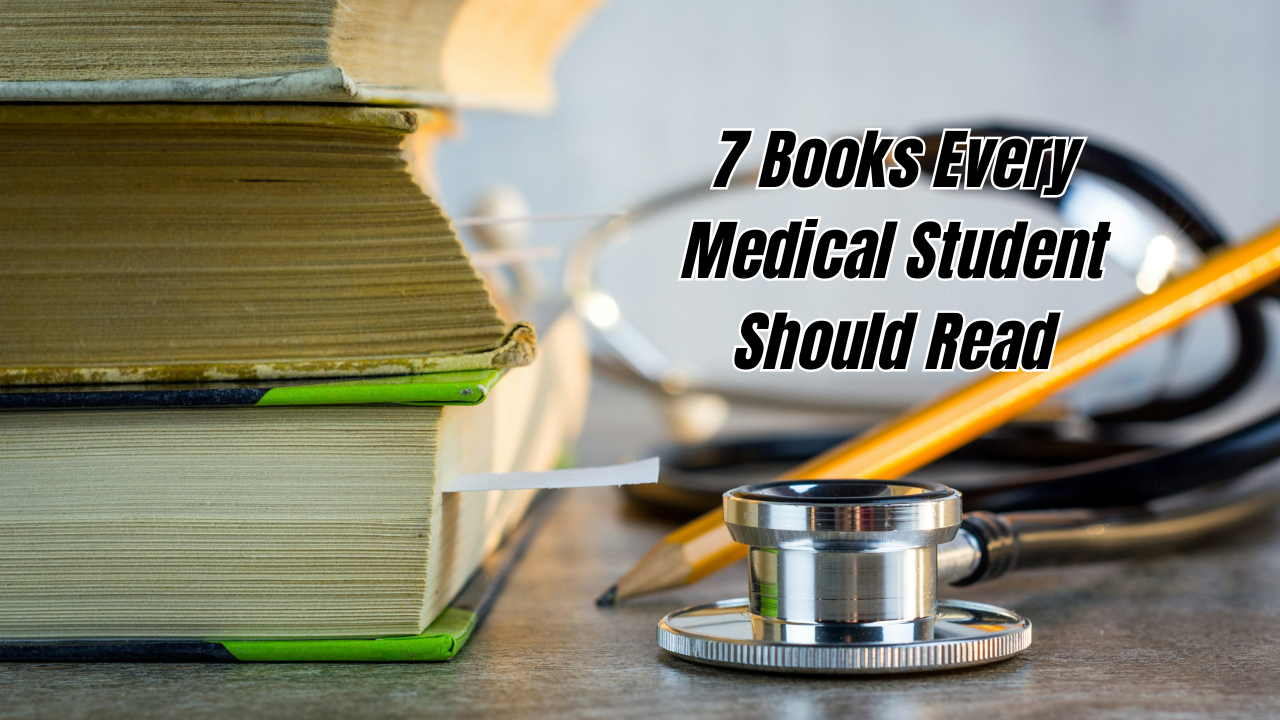Introduction
The journey through medical school is one of rigorous study, emotional growth, and developing resilience. While textbooks and clinical handbooks teach the science, narrative, reflective, and philosophical literature provides a deeper understanding of what it means to be a doctor, a patient, and a human in the world of medicine.
Beyond anatomy atlases and pharmacology guides, there exists a rich collection of books that shape the minds and hearts of future doctors. These seven titles are considered essential reading for medical students not just for knowledge, but for empathy, ethics, compassion, and self-reflection.
Table: Snapshot of 7 Must-Read Books for Medical Students
| Title | Author | Main Theme | Why Read It? | Recommended Stage |
|---|---|---|---|---|
| When Breath Becomes Air | Paul Kalanithi | Facing death, duality of doctor/patient | Insight into mortality and purpose | Pre-clinical or clinical |
| Being Mortal | Atul Gawande | End-of-life care, dignity, aging | Ethical reflection on aging and autonomy | Clinical years |
| The Emperor of All Maladies | Siddhartha Mukherjee | History of cancer, oncology, research | Historical + scientific narrative | Any stage |
| Do No Harm | Henry Marsh | Neurosurgery, fallibility, decision-making | Honesty about surgical life | Pre-surgical clerkships |
| The House of God | Samuel Shem | Medical residency satire, burnout | Humor, critique of medical culture | Final year or internship |
| How Doctors Think | Jerome Groopman | Medical reasoning, cognitive bias | Understand diagnostic errors | Clinical years |
| Complications | Atul Gawande | Medical ethics, learning curve, mistakes | Gripping real-life dilemmas | Any stage |
1. When Breath Becomes Air – Paul Kalanithi
🔹 Overview
A memoir by neurosurgeon Dr. Paul Kalanithi, written during his final year of life after being diagnosed with terminal lung cancer.
🔹 Themes
- Mortality and meaning
- Identity as doctor and patient
- Philosophical inquiry into purpose
🔹 Why It’s Important for Medical Students
Kalanithi’s journey forces medical readers to confront death not clinically, but personally. His transition from a life-saving surgeon to a terminal patient presents a rare dual lens of empathy.
🔹 Memorable Quote
“Even if I’m dying, until I actually die, I am still living.”
2. Being Mortal – Atul Gawande
🔹 Overview
A groundbreaking book that examines how medicine handles (or fails to handle) aging, dying, and dignity.
🔹 Themes
- Geriatric care
- Autonomy vs. medical intervention
- Hospice and palliative care
🔹 Why It’s Important for Medical Students
Too often, doctors are trained to prolong life rather than preserve quality of life. This book is a masterclass in navigating uncomfortable truths and advocating for patients’ wishes.
🔹 Core Takeaway
Understanding the humanity of aging equips future doctors to be compassionate caregivers, not just procedural experts.

3. The Emperor of All Maladies – Siddhartha Mukherjee
🔹 Overview
An epic biography of cancer, tracing its origins, discovery, battles, and victories from ancient times to modern therapy.
🔹 Themes
- Evolution of medical science
- Persistence of human struggle
- Research and innovation
🔹 Why It’s Important for Medical Students
This book inspires students to value scientific discovery, understand the context of disease, and see the human face of cancer beyond its biology.
🔹 Notable Strength
Rich with narrative but backed by rigorous research, this title bridges the gap between science and story.
4. Do No Harm – Henry Marsh
🔹 Overview
British neurosurgeon Henry Marsh takes readers inside the operating theatre and his own conflicted mind, chronicling successes and devastating failures.
🔹 Themes
- Precision and pressure
- Moral and surgical errors
- Emotional consequences of decisions
🔹 Why It’s Important for Medical Students
Rarely do surgeons admit fault so openly. Marsh’s reflections teach that human fallibility persists, even in sterile ORs. A powerful read about humility.
🔹 Key Insight
The patient isn’t just a diagnosis — they’re a life in your hands.
5. The House of God – Samuel Shem
🔹 Overview
A cult classic and fictionalized memoir about a group of medical interns in a brutal teaching hospital.
🔹 Themes
- Burnout and mental health
- Medical system dysfunction
- Cynicism vs. idealism
🔹 Why It’s Important for Medical Students
Controversial, raw, and unapologetically dark-humored, this book resonates with students on the emotional cost of training and the need for reform.
🔹 Caution
Meant to challenge assumptions, not necessarily to model professionalism.
6. How Doctors Think – Jerome Groopman
🔹 Overview
A deep dive into the cognitive processes and biases that influence clinical decisions — and how doctors can think better.
🔹 Themes
- Cognitive error
- Doctor-patient communication
- Diagnostic reasoning
🔹 Why It’s Important for Medical Students
Medical decision-making isn’t just about knowledge — it’s about judgment, intuition, and reflection. This book teaches you to pause and think about how you think.

7. Complications – Atul Gawande
🔹 Overview
A compelling collection of medical essays about Gawande’s own early surgical career and the broader healthcare ecosystem.
🔹 Themes
- Medical training
- Error and improvement
- Learning by doing
🔹 Why It’s Important for Medical Students
Offers a practical lens on medical growth, and teaches that mastery comes with vulnerability. It’s reassuring and sobering at once.
What These Books Teach Beyond the Curriculum
While textbooks teach what to do, these titles teach you how to be:
- Empathetic
- Self-aware
- Morally sound
- Historically informed
- Critical thinkers
They fill the emotional and ethical gaps left untouched by PowerPoint slides.
Conclusion
The seven books listed above are more than just stories — they’re reflections, warnings, philosophies, and guideposts for medical students walking the path to becoming physicians.
They’ll challenge you. Comfort you. Change you.
While mastering anatomy, pathology, and pharmacology is essential, developing empathy, perspective, and humility is what truly defines a great doctor. These books aren’t required by your curriculum — but perhaps they should be.
FAQs
1. Are these books part of medical school curricula?
Most are not official textbooks but are often recommended by professors and mentors to help students broaden their perspective beyond the clinical.
2. When should I read these books in my medical journey?
You can begin in pre-clinical years, but books like Do No Harm or The House of God may have greater impact during clinical rotations or internships.
3. Do these books replace standard medical texts?
Not at all. These are supplemental readings that foster emotional intelligence, ethics, and resilience in medicine.
4. Are these books helpful for non-medical readers too?
Yes! They’re written in accessible language and are equally powerful for patients, caregivers, and those curious about healthcare.
5. How can I find time to read during medical school?
Try audiobooks, set 15-minute daily reading goals, or use weekends. These books often refresh your motivation during burnout.
